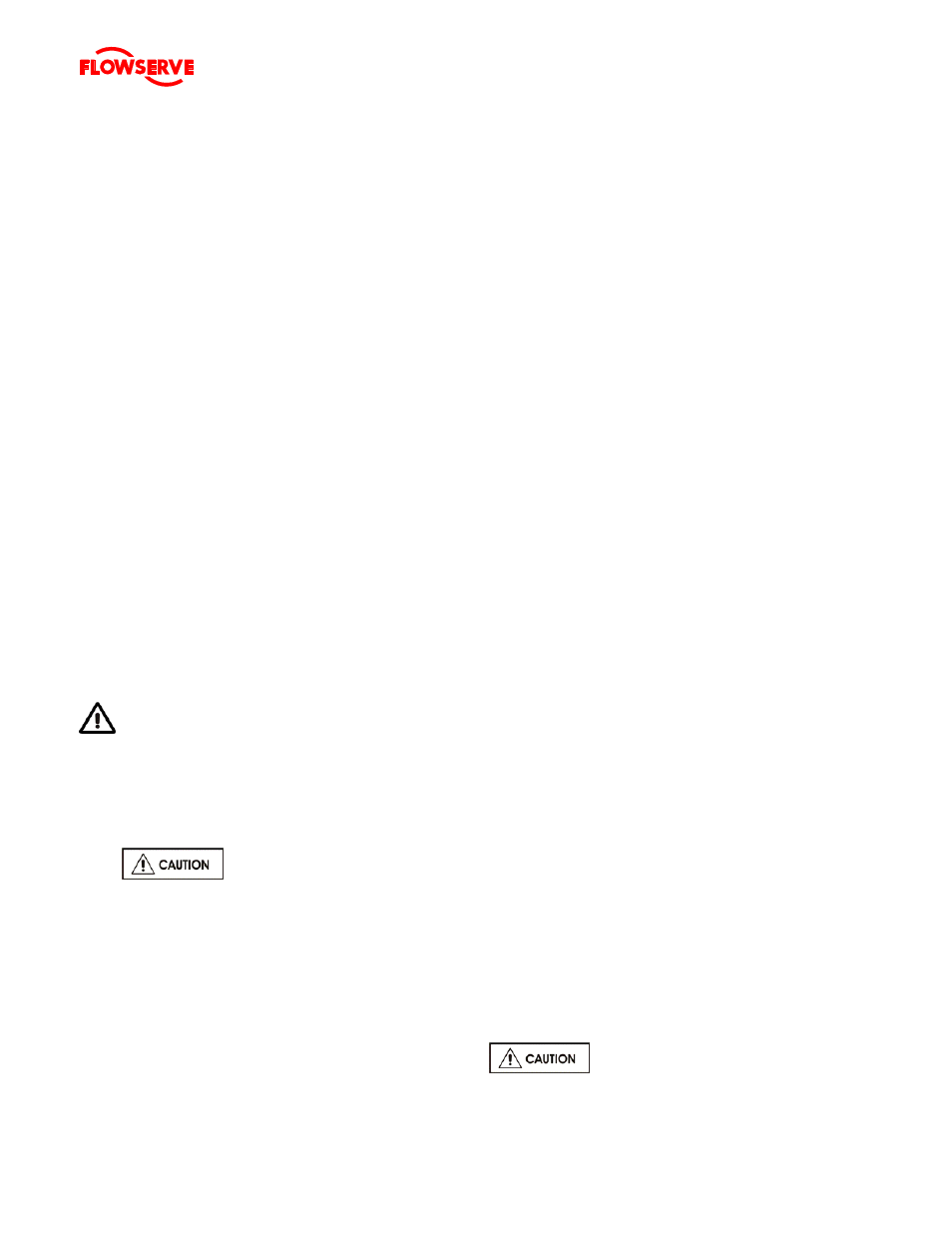Flowserve Twin Screw Rotary User Manual
Page 11

TWIN SCREW PUMPS. ORIGINAL USER INSTRUCTIONS. ENGLISH. 71569243 – 07/10
Page 8 of 53
®
2 TRANSPORT AND STORAGE
2.1 Consignment receipt and unpacking
Immediately after receipt of the equipment it must be
checked against the delivery/shipping documents for its
completeness and that there has been no damage in
transportation. Any shortage and/or damage must be
reported immediately to Flowserve Pump Division and
must be received in writing within one month of receipt
of the equipment. Later claims cannot be accepted.
Check any crate, boxes or wrappings for any
accessories or spare parts that may be packed
separately with the equipment or attached to side walls
of the box or equipment.
Each product has a unique serial number. Check that
this number corresponds with that advised and always
quote this number in correspondence as well as when
ordering spare parts or further accessories.
2.2 Handling
Boxes, crates, pallets or cartons may be unloaded
using fork-lift vehicles or slings dependent on their size
and construction.
The pump should be lifted with suitably sized and
located slings. Do not use the shaft for lifting and take
special care to prevent the pump from rotating in the
slings due to unbalanced weight distribution.
2.3 Lifting
A crane must be used for all pump sets in excess
of 25 kg (55 lb). Fully trained personnel must carry out
lifting, in accordance with local regulations. The driver
and pump weights are recorded on their respective
nameplates or massplates.
2.4 Storage
2.4.1
Short-Term Storage
When it is necessary to store a pump for a short time
before it can be installed, place it in a dry, cool location.
Protect it thoroughly from moisture and condensation.
Protective flange covers should not be removed until
the pump is being installed.
Wrap the exposed portions of the shaft and coupling to
protect against sand, grit or other foreign matter. Oil
lubricated units should be lubricated (refer to section
5.1.3 Lubrication) to protect the bearings. Grease
lubricated units are lubricated at the factory during
assembly. Turn the rotor over by hand at least once a
week to maintain a protective film on the bearing
components.
2.4.2 Long-term
storage
More thorough precautions are required if long-term
storage in excess of 90 days from factory shipment is
unavoidable.
The internal surfaces of the pump should be sprayed
with a rust preventative such as a water soluble oil or
other suitable alternative. Particular attention should
be given to the integral shafts, rotors and stuffing box.
Install gasketed metal flange covers on the suction and
discharge flanges (pipe plugs in the case of tapped
connections).
An optional method of protection is to suspend bags of
desiccant material inside casing and completely seal all
openings from the surrounding atmosphere. The
stuffing box should be packed with clean. dry rags.
Use of this method requires that the casing be initially
free of liquid. The desiccant material should be
checked at regular intervals to ensure that it has not
absorbed excessive water vapour. A warning
instruction, advising that the desiccant must be
removed prior to installation should be wired to the
pump.
A rust inhibitor should be added to the lubricating oil of
oil lubricated units to give additional protection without
destroying the lubricating properties of the oil. For
specific recommendations, consult your lubrication
dealer. Grease lubricated units, which can be identified
by the grease fitting at each bearing location, should be
well lubricated prior to placing in storage. Small
amounts of additional grease should be added at
regular intervals during storage. Refer to Section 5.1.3
Lubrication for additional information related to grease
lubrication.
Storage of pumps in areas of high ambient vibration
should be avoided to prevent bearing damage due to
brinelling. The risk of such damage can be reduced by
frequent rotation of the shaft.
The pump half coupling and key should be removed
from the shaft, coated with rust preventative and
wrapped to prevent metal-to-metal contact. Exposed
surfaces of the pump shaft should be protected with a
rust preventative. All dismantled parts should be
wrapped and tagged according to pump serial number
and a record kept of their location.
Pumps covered with plastic should
not be stored in a cool environment because
resulting condensation can cause rusting.
